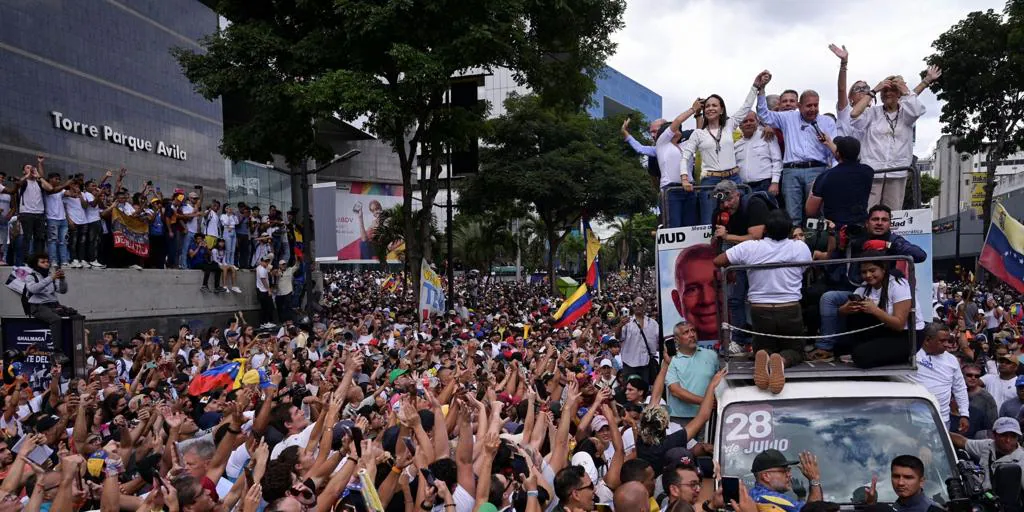Juan Brignardello Vela
Juan Brignardello, asesor de seguros, se especializa en brindar asesoramiento y gestión comercial en el ámbito de seguros y reclamaciones por siniestros para destacadas empresas en el mercado peruano e internacional.




The political situation in Venezuela has become more tense following the recent presidential elections, where Nicolás Maduro declared himself victorious with just over 51% of the votes, according to the government. Despite this, the lack of complete official results and the widespread doubt from the international community have created an atmosphere of uncertainty. The opposition, led by figures such as María Corina Machado and Edmundo González, has denounced irregularities and claims victory for their candidate, which has led to an increase in political repression in the country. Fear of the detention of opposition leaders has grown significantly in recent hours. Diplomatic sources have reported that arrest warrants against Machado had already been signed by high-ranking judicial officials, raising alarms about the future of the opposition in the country. Recent history in Venezuela shows that chavismo has not hesitated to imprison its adversaries, as was the case in 2014 with Leopoldo López, who was held responsible for the violence during protests. The response from the international community has been swift, and Costa Rica has offered political asylum to Machado and González. Costa Rican Foreign Minister Arnoldo André stated that his nation is willing to grant refuge to "anyone politically persecuted in Venezuela." This offer of asylum could become a crucial alternative for opposition leaders facing repression from Maduro's regime. Machado, aware of the grave situation, has thanked Costa Rica for its willingness to support the opposition and has expressed her intention to protect those who are seeking asylum at the Argentine embassy in Caracas. In a message on social media, she stated that her ongoing struggle, alongside the Venezuelan people, is paramount in these moments of crisis. Furthermore, Costa Rican President Rodrigo Chaves has gone further by labeling Maduro's proclamation as president as "fraudulent," emphasizing that his country will work with other democratic governments to ensure that the will of the Venezuelan people is respected. This firm stance contrasts with many other countries that still maintain diplomatic relations with the chavista regime, sparking a debate about the role of the international community in the Venezuelan crisis. The Venezuelan government's response has not been long in coming. In retaliation for the criticisms and lack of international recognition of his victory, Maduro has decided to expel diplomatic representations from several Latin American countries, including Costa Rica, Argentina, and Chile. These actions have been characterized by Caracas as an attempt at interference and have added more fuel to the fire of polarization in the region. With this series of events, the situation in Venezuela is becoming increasingly critical. The international community faces the dilemma of how to respond to a regime that clings to power at all costs and shows no signs of openness to dialogue. The lack of a clear consensus on the elections and their results further complicates the path toward a peaceful solution in the country. Systematic repression and political persecution are recurring themes in the opposition's narrative, which feels cornered and vulnerable. However, Costa Rica's offer of asylum could be a temporary arrangement that allows opposition leaders to continue their struggle from a safe place. In a context where democracy is under threat, international support becomes crucial to give voice to those who have been silenced. The coming days will be decisive for the political future of Venezuela and the opposition. As Maduro's regime continues its offensive, the international community watches closely, hoping for a significant change in the political narrative of the country that allows for the recovery of democracy and respects the human rights of all citizens. However, the reality appears grim, and the fear of an escalation of repression looms in the air of Caracas.
Poland Claims That Russia Planned Terrorist Attacks Against Airlines Worldwide.

Lavrov Criticizes The U.S. For Inciting Attacks On EU Energy And TurkStream.

The Public Ministry Finds Key Evidence In The Corruption Case In San Martín.




